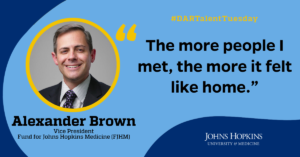Alex Brown

Alex Brown has long admired Johns Hopkins. He joined the institution in October as the new vice president of FJHM. In his role, Alex leads the team responsible for managing individual and organizational relationships with prospects, donors, and alumni to secure private support for the entirety of Johns Hopkins Medicine.
“When the FJHM vice presidency became available, I was intrigued to explore,” he says. “The more people I met — and I met a ton of faculty and staff during the process — the more it felt like home.”
Prior to Hopkins, Alex spent more than two decades at his alma mater, Emory University in Atlanta, serving in leadership positions.
Alex grew up in Florida, living in Naples and Orlando. He’s now enjoying a new chapter in Baltimore and exploring the region with his family. “I’m usually trailing behind my 8-year-old daughter and husband, who are extroverts with busy social lives. I’m the introvert along for the ride,” he says.
What does your job involve that others might not realize?
Understanding the personal feelings, hopes, and fears of leadership and faculty members is a significant part of my job. Each of us shows up in a space with unique baggage, no matter how senior you may be in an organization. Often, even the largest principal gifts hinge on interpersonal dynamics. I try to be neutral, staying aware of my own feelings and challenging myself when I feel them taking over.
How did you get into the development and alumni relations field?
A couple years out of college, I was working at a national nonprofit as a grant writer. I saw a posting at Emory that I thought was in development. Turns out, I was hired to review federal grant applications and then started negotiating clinical trial contracts with drug and device companies. After arguing with attorneys every day for several years, I jumped at the chance to be a development officer for the Emory Vaccine Center as it was developing HIV vaccines and therapeutics.
What have you learned since starting in your role at Hopkins?
Hopkins is a highly complex place with funding structures and historical precedents that create enormous fundraising buy-in for faculty members at departmental levels, but the same factors creating ownership also make change slow and difficult. It’s a challenge we work at every day.
What trends are you seeing in health sciences fundraising?
Funders are looking for solutions to the things they want to change about the world. They are less driven by loyalty to one institution and increasingly expect a lead institution to build a team that spans many internal divisions and pulls in collaborators at other universities and health systems.
The pressure on health sciences fundraisers to navigate institutional desires for endowment and unrestricted funding and younger donors’ preferences for specific project support is at an all-time high. Health sciences donors have always felt a sense of urgency that tilts toward expendable funding, but the academic medical center financial model is severely strained, and a healthy endowment preserves the research and education missions.
What do you like to do when you are not working?
My two constantly evolving Spotify playlists are among my prize possessions, and I lose myself in music in free moments.
Please share something we don’t know about you.
I love art and architecture. I have a strange talent for remembering exact colors and matching them from memory. If you need to pick out paint colors, I’m your guy.
Tell us something we might not know about Johns Hopkins Medicine?
Mary Elizabeth Garrett’s story of her founding gift for the Johns Hopkins School of Medicine fascinates me. If you haven’t heard how she influenced who U.S. medical schools admit and how they teach, you should ask around. I admire contemporary donors challenging the status quo in equally wonderful ways.